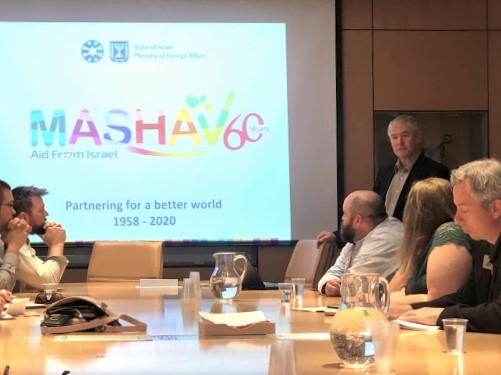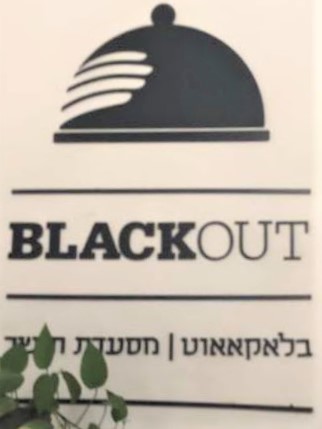Jayma Appleby, Sean Goretskie and Sara Mitchell – Presiding Fellows
“Knowing people different than you, hearing different voices – that’s the key to leadership. Diversity is paramount.” Mishael Zion shared that during our visit with the Mandel Institute in Tel Aviv today. That sentiment also serves as a theme of the day as we heard about the history and conflict in the region, learned about leadership and innovation, and experienced what it’s like to be blind at a Black Out dinner that evening.
We started our day at the Department for Ministry of Foreign Affairs in Jerusalem, visiting with Danny Zonshine at MASHAV, a program similar to USAID. Israel is a country with limited funds available to support other nations, so they focus efforts on sharing experience and know-how with the developing world. For example, sending irrigation experts to countries with water challenges.

Itai Bar Dov, the director of Consulates Department for the North America division, at the Ministry of Foreign affairs, explained the current geopolitical climate in the Middle East and the history of Israel within it. He commented that it’s hard to truly explain the Israeli mindset about security to those that don’t live it every day, but the history and ongoing conflict in the region definitely underscores the gravity of what they face every day.
For example, Hamas is a terrorist group that runs the Gaza Strip and is always looking to wipe Israel off the map. The residents of Israel close to the Gaza Strip have bomb shelters built every 15 seconds apart (walking distance) because the need to reach safety once Hamas starts firing missiles at any given moment is that great.
Hezbollah is another terrorist group, located in Lebanon, and controls the southern portion of Lebanon. They are primarily funded through Iran, which influences their mission. They estimate Hezbollah to have 120,000 rockets that are ready to be fired at Israel. Israel recently discovered six sophisticated underground tunnels from Lebanon to Israel that were dug from civilian homes. Both Hamas and Hezbollah like to use civilians as cover for their operations. Israel filled the tunnels with concrete to disrupt their options.

After lunch, we went to the Mandel Institute, a world-renowned leadership institute. According to Ben Dasker, program director for the organization, Morton Mandel and his brothers founded the institution as a way to have a better impact on the Jewish community. He believed the most important asset in any organization was its people, and the best way to cultivate that is through leadership. He also believed the most effective way to leadership was to create innovative institutions, which is why many of the participants work in education but not exclusively. Teaching leaders to think like educators is a foundational tenant. Mort’s goal was to populate those in government positions with graduates of the program. In fact, the army looked at the Mandel style to build better officers and train those that would go into the educational field upon retirement.
The Mandel Institute targets mid-career individuals, accepting about 20 positions every two years from approximately 500 applications. We no longer live in a world where you are employed at one place for your entire life. Therefore there is a need to continually evolve, engage in ongoing education and create lifelong learners.

Misheal Zion, a rabbi, teacher, author, and program manager at the Mandel Institute, shared the organization’s view on leadership, why it’s needed and how they’ve become an Ivy League-equivalent in leadership development. Whatever you value, you need to know how to speak to each other, and those different from you. Tools, strategies, and management are important, but knowing your story – your identity and values – is the real key to leadership. The Mandel Institute teaches participants to ask big questions. They study big thinkers and philosophers in order to analyze rich concepts and ideas, to focus on the intellectual firepower of the group. Zion shared that on a societal level we all get along, but not always on a political level, therefore the Mandel Institute is starting to look at leadership on a cultural level. Zion closed by asking the group to think about people’s stories when you meet them on the street. We’re all on a journey. What’s your dream?
From walking the steps of Jesus in the Old City of Jerusalem and visiting the Western Wall, the most religious site in the world for the Jewish people, the history and importance of this place was not lost on the class. Regardless of your faith, there’s no doubt the power and reverence Jerusalem holds for so many around the world.

The group closed out the evening with a Black Out dinner at Na La, an experience designed to change the way you ‘see’ the world. The class dined on a three-course meal in complete darkness, served by blind servers. What an amazing experience to learn from the staff, and experience such a common experience through a new perspective. Yes, there was likely some food spilled, stumbling around and meals eaten with fingers, but it was definitely a night the class won’t forget!

